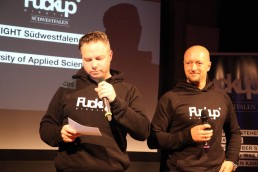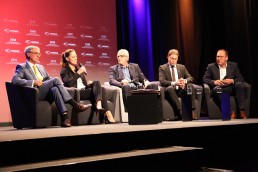Southwestphalia's first Fuckup Night: Courage to fail!
Falling down, standing up, straightening the crown, continuing - that was the clear message to the 100 or so guests at the first Fuckup Night in South Westphalia. Three entrepreneurs in Iserlohn told of their big business failures.
Instead of a roaring party, the first Fuckup Night of South Westphalia took place last Thursday in the student club B7 on the Campus Seilersee. DJ Florian Tresp provided the colourful mixed audience with atmospheric techno beats, the students of the UE served mulled wine and the presenters Torben Feil and Frank Höhne led with a lot of humour through the exciting evening.
In the center three entrepreneurs were located, who flew all vocationally already at least once fully on the muzzle. As different personalities as they were on the small stage in the dim bunker of the university, they all have one thing in common: They fell deeply, but they climbed the career ladder again afterwards. In fifteen lively minutes each, they performed their biggest business failures. One with a lot of wit, the other full of emotions and the last with a huge portion of self-confidence.
Funny and emotional businessails in fifteen minutes
The start is made by a young entrepreneur from Iserlohn. He once studied at the Seilersee campus himself, and a few guests still know him from their time together. He tells his story with all its ups and downs in a carefree and entertaining way, often you can hear a loud laugh in the audience.
The emotional performance of his successor is completely different, there is silence in the audience. The over 60-year-old middle-class man from Werdohl has lost everything and has nevertheless resurrected. With his words that as a Christian he forgives all people, he touches the guests and reaps respect and warm words from all sides.
The last speaker comes on stage self-confidently. He knows how to sell himself well. Today's Amazon coach reports on the great rise and deep fall of his company. But the former entrepreneur has not only judged his crown, he has also become emperor: he now earns twice as much as before.
Networking and exciting conversations at a late hour
After the lectures, the guests strengthen themselves at the tasty buffet in order to start well strengthened into many informative and entertaining conversations. A little networking here, a selfie there and a cool drink there. The music is turned louder. Only late the successful Fuckup Night at the Campus Seilersee ends.
"Digitze or Die - How to attract young professionals to rural areas?
What are the advantages of digitisation? What impact does digitisation have on the labour market? In concrete terms: How can digitisation stop the increasing shortage of skilled workers in the South Westphalia region? International and national politicians as well as regional economic experts discussed these questions at the Iserlohn Economic Conference “Campus Symposium” at the beginning of September. Among those present were the former President of the EU Commission José Manuel Barroso and Minister of State Dorothee Bär.
Digitalisation can no longer be stopped. But compared to other countries, Germany is lagging behind in terms of digital progress. If Germany took advantage of the opportunities offered by digitisation, it would have many advantages: Above all, the increasing shortage of skilled workers in the regions could be stopped. The Internet makes it possible to exchange information with stakeholders from any location and to work from anywhere.
The German regions are still strong, especially characterized by a high level of small and medium-sized enterprises. The South Westphalia region alone is home to over 150 world market leaders and is one of the three strongest industrial regions in Germany. And “just because we are now a strong industrial nation doesn’t mean that we can’t even become a successful digital nation,” Bär is convinced. But there is still a long way to go.
Digitization makes it possible to work from any location
“I have the impression that we have got stuck in the Prussian authoritarian state,” says NRW Digital Minister Pinkwart, deploring the digital development in Germany, “NRW has a thorn in its flesh when it comes to digital start-ups. But that is about to change, the state of NRW wants to develop a digital strategy together with the citizens. In addition to infrastructure, education and health, the focus will be on small and medium-sized businesses. “We have something that other countries do not have. We have an outstanding middle class that no other country in the world can boast of. We have to strengthen them and make them fit,” Bär proudly announces. In order to make even better use of the opportunities offered by digitisation for the regions, we need to join forces and build networks. It is no longer necessary to move to the capital cities. Digitisation makes it possible to work from anywhere. “The future will not take place in Berlin or Hamburg”, says Bär, “but in Iserlohn”.
Networking is the be-all and end-all for young professionals in the digital world
In an interview with the Iserlohner Kreis-Anzeiger, Kim Höhne, founder of the first Coworking Space in Iserlohn, provides concrete ideas on how the shortage of skilled workers in South Westphalia can be remedied. First of all, the needs of the target group had to be addressed, the needs of the young digital professionals. In addition to soft location factors, companies can also contribute a lot: “It’s not just about working for a hot brand, but also about the corporate culture that prevails with these brands. What this means is an open work culture where flat hierarchies prevail, where responsibility can be assumed and where networks can be built. “Especially those who want to and can help decisively with the digitization appreciate the flexible working.
One approach to networking young people and creating flexible work opportunities is coworking. “It’s about building a community that attracts others who follow these approaches and are at home in the digital world. The Coworking Space in Iserlohn is a first step into a digital and networked South Westphalia.
Photo: Frank Höhne


